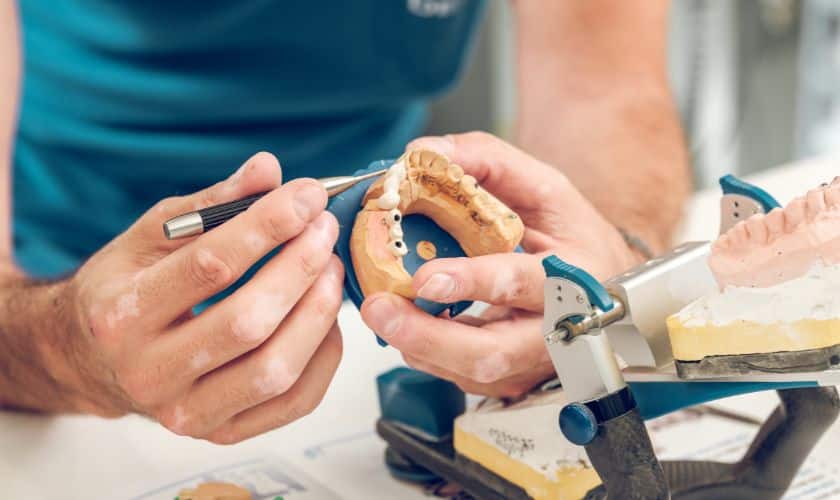Are you tired of living with a gap in your smile? Missing teeth can be embarrassing and affect your confidence. Fortunately, single tooth dental implants offer a permanent solution that looks and feels like natural teeth. But what are they, how do they work, and who is a good candidate? In this blog post, we’ll cover everything you need to know about single tooth dental implants – from the procedure itself to aftercare tips – so you can make an informed decision about whether they’re right for you. Let’s dive in!
Introduction to Single Tooth Dental Implants
If you are considering having a single tooth dental implant, there are a few things you should know. Dental implants are a popular and effective way to replace missing teeth. They are usually made of titanium and are placed in the jawbone where they fuse with the bone over time. This helps to provide stability for the artificial tooth, which is called a crown.
Dental implants can be used to replace one or more missing teeth. If you are only missing one tooth, If you’re looking for Prevention Tips for Children, then a single dental implant may be suitable for you. The implant will be placed in the space where your tooth is missing and will eventually fuse with your jawbone. Once this happens, your dentist will be able to attach a crown to the dental implant. The crown will look and function just like your natural tooth!
If you have multiple missing teeth, you may still be a candidate for dental implants. In this case, multiple implants will be placed in your jawbone and then connected with an artificial bridge or denture. Dental implants can give you back your smile and improve your oral health!
What Are the Different Types of Dental Implant Restorations?
Dental implant restorations are used to replace one or more missing teeth. There are three main types of dental implant restorations: bridges, dentures, and implants.
Bridges: A bridge is a dental restoration that spans the space where one or more teeth are missing. The bridge is affixed to the neighboring teeth (abutment teeth) and can be crafted from various materials, such as porcelain, metal, or a blend of both, taking into account Fluoride considerations.
Dentures: Dentures are dental prosthetics that replace all of the teeth in the upper or lower jaw. They are removable and can be made from a variety of materials, including acrylic, metal, or a combination of both.
Implants: Implants are titanium posts that are surgically placed into the jawbone to serve as anchors for artificial teeth. Implants can be used to support a single tooth (crown), multiple teeth (bridge), or even an entire set of teeth (denture).
Benefits of Single Tooth Implants
Single tooth dental implants are a popular treatment option for people who are missing one or more teeth. There are many benefits to single tooth implants, including:
1. Improved Appearance: Dental implants look and function like natural teeth, which means they can greatly improve the appearance of your smile.
2. Better Oral Health: Dental implants do not require the removal of healthy tooth structure like traditional bridge treatments do. This can help to preserve your oral health in the long term.
3. Increased chewing efficiency: Dental implants allow you to chew your food more effectively, which can lead to improved digestion and overall health.
4. Enhanced self-esteem: By reinstating your smile, dental implants can help you regain your confidence, all while maintaining diligent brushing.
5. Durability: With proper care, dental implants can last a lifetime!
What Is the Process Like for Getting a Single Tooth Implant?
The process of getting a single tooth dental implant is fairly straightforward. First, your dentist will assess your mouth to make sure you are a good candidate for the procedure. If you are, they will then take an x-ray of your mouth in order to determine where the implant should be placed. Once that is determined, they will numbing your gums and jawbone before making a small incision in order to place the implant. Finally, they will close up the incision and give you instructions on how to care for your new tooth.
Aftercare and Maintenance for Single Tooth Implants
It is important to take care of your dental implants to ensure their longevity. Here are a few tips on how to best take care of your single tooth implant:
-Brush and floss your teeth as you would normally, being sure to avoid the implant site when brushing.
-Use an interdental brush or water flosser to clean around the implant.
-Visit your dentist regularly for checkups and cleanings.
-Avoid chewing hard foods on the side of the mouth with the implant.
-Do not use tobacco products, as they can increase the risk of implant failure.
Alternatives to Single Tooth Implants
If you are looking for an alternative to single tooth implants, there are a few options available. One option is to get a dental bridge. This is where a false tooth is placed in between two existing teeth. Another option is to get a dental flipper. This is a removable appliance that can be used to fill the gap left by a missing tooth.
Conclusion
Single tooth dental implants are an excellent option for those who need to replace a single missing tooth. Not only do they look and feel natural, but they also protect the adjacent teeth from further damage and decay. With proper care, you can expect your dental implant to last many years. If you’re considering a single tooth replacement, be sure to consult with your dentist to discuss potential risks and benefits of this procedure.
FAQs
Q: Will I be able to eat and drink normally after getting a single tooth dental implant?
A: Yes! One of the great things about dental implants is that they function just like your natural teeth. You’ll be able to eat and drink whatever you want without having to worry about your implant.
Q: How long will my single tooth dental implant last?
A: With proper care, your dental implant should last a lifetime!




